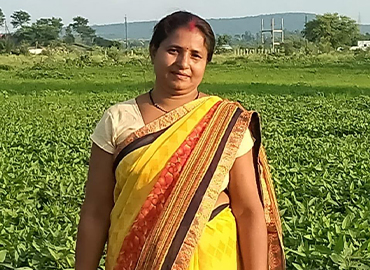
Despite being the fastest growing country in South Asia, humanitarian challenges like malnutrition continue to affect many Indians. While the widening socio-economic gaps are looming over farming communities, training programs like Nutri Sakhi are active amongst their neighbourhood to spread awareness about nutrition while maintaining a sustainable approach and boosting livelihood. Preeti Shrivastav is one of the farmers who leads the change in block Phanda of district Bhopal, with a persistent commitment to the cause.
A balanced approach to farming and livelihood
Though within the influential limits of city Bhopal, the village Sarvar has succeeded in preserving the sanctity of village life and culture. Humbleness in tone and modesty in appearance, almost every woman in the area talks as if they belong to the same sorority. But one of the women carries an aura which separates her from the rest of the crowd. Preeti Shrivastav is a woman farmer who leads a family of 6 and manages multiple professions simultaneously. She is the Nutri Sakhi [Nutri(tion) Friend] for the district Bhopal in Madhya Pradesh.
A crumbling economy or even a failed monsoon serves as no deterrent to farmers like Preeti. Not just an active Soy farmer, her involvement in the microbusinesses like dairy, nuts and fried snacks is an inspiring example of how to get the best out of your professional life. With Good Farming – Good Food, Preeti established a market presence and showcased her talent in many of the farmer’s exhibitions. But apart from the success in personal affairs, Preeti’s contribution to the community outweighs all her other inputs. She focuses a vital part of her time guiding her companions through the nutrition program (Nutri Sakhi) launched by Solidaridad. Her excitement-filled description introduces the program in an optimistic tone.
Soy, as per Preeti, has been made an integral part of her community's diet. Farmers now reap the benefits of practical apprenticeship sown by Solidaridad’s comprehensive training programs. The spotlight also falls on her supporting family and an encouraging husband, confirming the programme’s social acceptance.
Training as a key to unlock the knowledge
Nutrition has been a much-discussed topic in developing countries. India is no different. Nowadays, eradicating malnutrition is a top priority in most health ministries and organisations like WHO. Relief packages and medical assistance forms an integral part of their missions. But the solution cannot be stated as permanent where hunger and famine are directly related to the erratic monsoon cycles. While natural forces cannot be challenged, some improvement in farming practices can reduce the overall impact.
Preeti is a part of an elaborate training program where she receives training in good farming practices from some of the best institutes. The custom-tailored events also show her the techniques that reduce the time and money spent on farming. Her efforts to reach out to the distant areas for spreading nutrition message has been widely successful.
Inability to reach out to remote villages is one of the primary reason why the reports of malnutrition often come from peripheral locations. Nutri Sakhi is a program that helps to penetrate such areas. Because people involved in spreading the nutritional directives are locally selected, their outreach to the distant areas is far more effective than anyone else. More importantly, people get trained by one of their own from the community, and in a language, they are comfortable with. Preeti talks about how she has started helping farmers around her and why is it important for others to know.
Preeti’s effort towards bringing a concreate change in farming attitude has influenced hundreds of lives by now. Encouraging farmers to develop a kitchen garden is one of the many objectives of her training exercises. She also addresses the nutritional issues faced by children and pregnant women during her training sessions. A determined approach in the direction of self-dependency is slowly becoming the new normal in her community.
